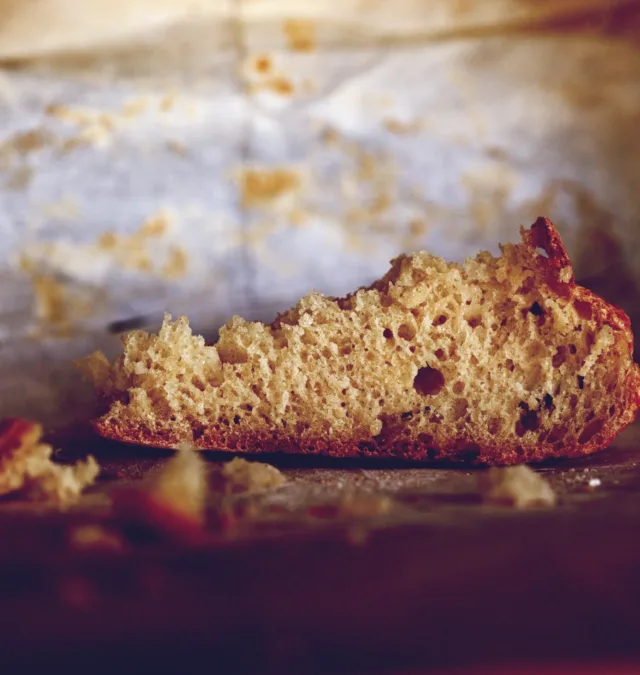
What I Learned Fasting 8+ Days
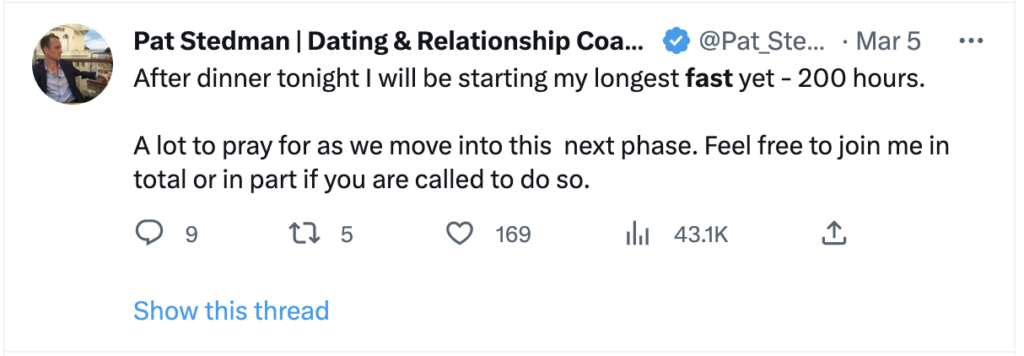 .
.
A bit of a different topic from our usual ones.
But was asked by a few of you to talk about my experience the other week fasting for 8.5 days (205 hours to be precise). And considering I didn’t journal throughout the process, this is probably a good way for me to kill two birds with one stone and both preserve the experience for myself and share it with you.
First things first: some background on my experience with fasting, and why I decided to do this long one in particular.
A History Of Fasting (For Me)
I initially heard about fasting probably in 2015, when it (and ketogenic dieting generally) became the new popular diet in the manosphere.
Mostly this fad concerned “intermittent fasting,” which is generally “meal window” eating (you only have 4-8 hours in a given day to eat). Some more intense “intermittent fasting” plans would advocate 1-2 non-consecutive days per week without eating. But for obvious reasons (muscle loss), the fitness community would almost never push these fasts past 36 hours.
This type of fasting is good for you, and if you’re trying to cut weight or maintain a leaner figure, it might make sense for you to do it. It’s an excellent way of regulating blood sugar and indirectly moderating calorie consumption.
But there were other people — more in the alternative health space than fitness — who wanted to explore further the benefits of fasting. What happened when you fasted longer than a day? What about 3 days? A week? A month? Longer?
I read many accounts of these experiences and was fascinated by what I heard.
Essentially, digestion taxes your bodily systems, and when it is ongoing your body doesn’t have any time to do any “maintenance checks.” It’s kind of like keeping a factory assembly line running all the time — if something is off, it’s going to accumulate wear and tear.
Fasting for extended periods of time allows the body to shut off and perform these checks. In short, it allows the body to repair itself — to heal.
This process is called “autophagy,” and it was promised by many as a sort of fountain of youth. People talked about all sorts of maladies being eliminated through extended fasting. Gut problems resolved, liver disease cured, parasites cleansed (after a few weeks they had nothing to feed on and were literally shit out). Even cancers would go into remission. Indeed, during an intimate 45 minute conversation in a spa, one of the things the great real estate investor Stefan Aarnio (RIP) and I talked about was his experience fasting for 40 days in the Amazon to kill his cancer. It likely prolonged his life an additional 3 years.
But at this point I hadn’t done any fasting beyond a day or so. It wasn’t until 2020 that I felt called to push further. I did 3 days that spring, then 5 days that summer.
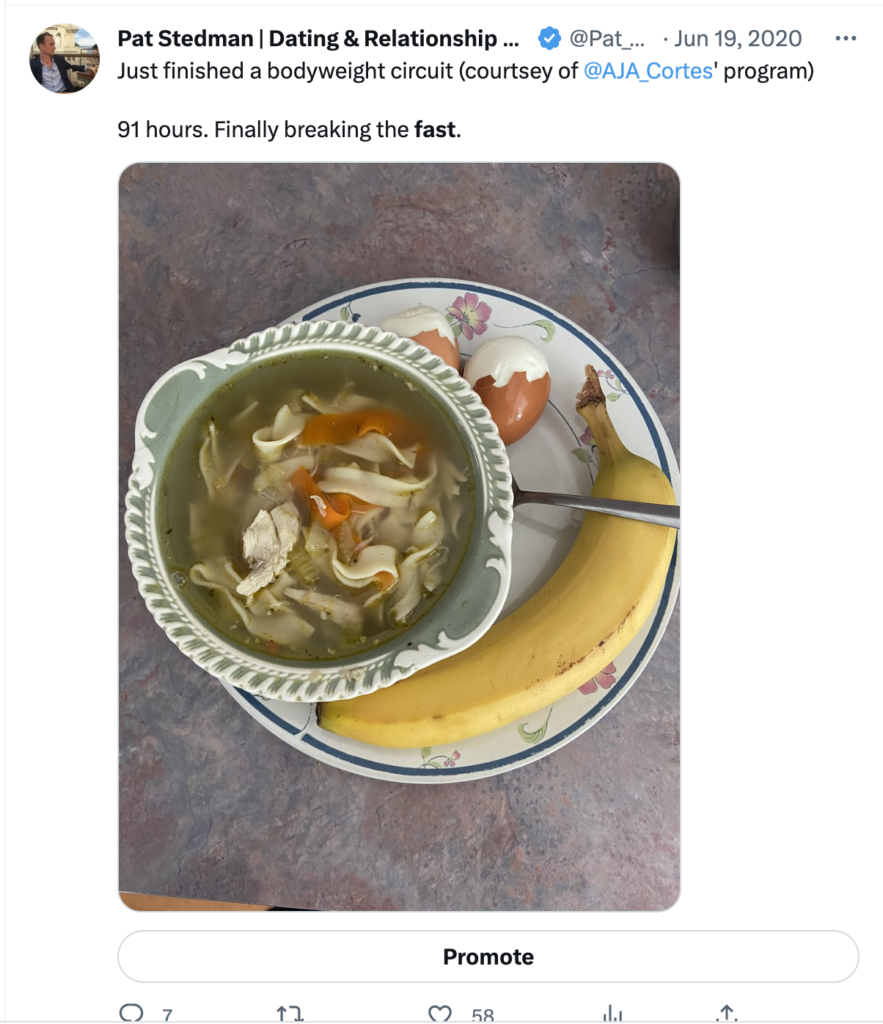
And then in the fall, I embarked on my most ambitious fast yet: a 7 day, 80 mile trek without food in the mountains.
Tomorrow morning I'll be leaving on a 7 day, 75 mile solo-hike in the Appalachians.
Will be fully fasted throughout this and completely electronically disconnected.
Taking the deep work to a different level.
— Pat Stedman | Dating & Relationship Coach for Men (@Pat_Stedman) September 17, 2020
(READ: 5D Frame)
The intent behind this expedition was not weight loss, or even autophagy. It was to harness the less material benefits of extended fasting: to test my mind, and to get closer to God.
I put myself through frost, fatigue, and famine for a week in order to prepare myself for my ordeal that I sensed intuitively would be coming for me. I needed to show myself that I was strong enough to handle this unknown burden. And I needed to develop a deeper relationship with God so I could trust he would help carry me when that strength was tested. I had ample practice for this in the woods, climbing up cold, steep slopes from sunrise to sunset with no energy and blistering feet. All I could do was put one foot in front of the other, and with each step ask “God give me strength.”
Because of this fast, when that test came in January 2021 I was calm and prepared.
Letting Go of the Past
After that trek, I didn’t fast for over 2 years.
The truth is I just didn’t feel called to. I lost 15 pounds during that hike, and was leaner than I had been since high school. I put my focus into my new daughter, my business, and to lifting.
But to a certain extent, it was also because I was letting myself go.
The stress of my activism in the 2020 election and its aftermath pushed me to drink even more than I was before — and I had already been a fairly consistent drinker. By mid-2022 I was forced to face this issue in myself. I was starting to look dumpy and bloated and was on the verge of a dad-bod. So I gave up drinking for 5 months, and focused on recovery.
At thanksgiving I resumed drinking again, and admittedly enjoyed myself through the holidays. But as 2023 hit I felt suddenly called to fast again, both for detox and spiritual purposes.
So I started the year with a 3 day fast, and committed myself to do 1 day a week until J6 was behind not simply me but all the political prisoners. In February I did another 3 day fast, leaning into this idea of starting each month off right with an extended one. But March presented a different opportunity.
Everybody might struggle with different aspects of not-eating, but for me the hardest part about fasting is not the hunger, but the fact that food is a social act, and by not-eating you are essentially socially alienating yourself. In other words, fasting sucks around people who aren’t fasting. Think non-drinkers around drinkers, and then amplify this by 10.
But I had an opportunity. My wife and kids would be visiting family in Poland, and my parents would be visiting my sister, so I was alone for a week: perfect for a long fast to get the deep detox and spiritual communion I was looking for.
The truth is though, I didn’t really know why I was doing the fast until I was into it, just like I didn’t understand last time why I did my fasted hike. It was more a knowing: “You have to do this now, and it will make more sense later.”
I just knew I had to purge. To let go.
Which in hindsight was the big difference between this time and last.
Last time I was preparing to take on a burden.
This time I was preparing to carry it through its conclusion.
(READ: January 6th)
Into Ketosis
You should understand that fasting is not “hard.” But it does require mental commitment.
Whenever I have said to myself, “oh I should probably fast tomorrow,” I don’t. There is nothing that provides more dopamine than food, and your Will will buckle under a freshly prepared meal placed in front of you.
But if you commit yourself to the fast, and know that you will complete it, then the discomfort is just noise, and you will easily resist temptation. In fact, it is not even really tempting; it is just a distraction.
I had a big meal the night before my fast (too big, got indigestion), and clocked in the next morning at 193.6lbs. Cool. Let the games begin.
Day 1-2
These initial days are the most daunting for people, because you are breaking a pattern and are hungry throughout most of the day. Your body is expecting to get food, and gets pissed when it doesn’t. For many people not used to fasting, while they might be more focused initially, they start to drag at the end of the day.
Black coffee helps with this, because it suppresses appetite, which is why it is a favorite of intermittent fasters.
Even though a big intention of mine during this week was to get a lot of work done, I admittedly fucked around most of Day 1. I guess I was resistant to starting it. By the afternoon though I was disgusted with myself. I went for a long walk, submerged myself in the bathtub, and woke up reborn. This wasn’t a problem the rest of the week.
On Day 2, since this fast was designed for “self-care,” I got my first (or second?) ever facial. Turns out my lady was a big Trump supporter; without sharing too much there were a lot of synchronicities. I started to understand this fast was going to be a preparation for case-related activities this spring.
Day 3-4
These are objectively the worst days, and it’s when most people drop out. You are still hungry, but now you are also cold and weak. Glycogen (reserve carbs stored in the liver) are finally fully depleted, and you are shifting into ketosis (fat burning). As this occurs your body temperature goes down.

And worst of all, you have a headache. Mine were mild — maybe 3/10 — but they were also incessant. Again, unless you are anchored into the fast, you will break when this happens. Your body is begging to be fed.
On Day 3 I began considering I might be low on electrolytes. My water is reverse-osmosis and completely remineralized, and I was taking supplements to aid in detox. But I had a few heart palpitations, and I know that is usually a signal of lack of minerals. So I started sucking on some salt (from a mine in Poland, Wieliczka) and found some old, tiny limes in the fridge. I cut them up and squeezed half into a glass of water in the morning and the evening. Limes have potassium which is important for electrolyte balance. Bonus: salt and lime almost made me feel like I was taking shots of tequila.
By Day 3 coffee began to lose interest for me. Rather than my normal 3 cups, I had 1.5 on Day 4.
On Day 3 I went to see an energy healer. This was a profound experience, and it was then that I realized just how much resentment I had been holding onto. There was a lot stored in my liver that she helped release. At the end of the session, she drew a card for me. I almost teared up. Prior to the session, I had asked God for guidance on how to proceed with a matter in my case. I asked for a sign, because I was lost.
The card answered every question. Message received.
Cruising Altitude
Day 5-7
At this point I was no longer feeling any headaches. The transition to ketosis had occurred. I felt energetically light and mentally sharp; I was capable of deep focus yet my mind was empty.
Because most people do not persist in their fast, they don’t get to this point — which is a shame. This is when bodily healing kicks into overdrive. Your gut has really shut down now, and all energy is being focused on clearing crap out. You have nothing left now to pass (I had normal bowels on Day 1, a light one on Day 2, none on Day 3, and a normal one Day 4 — nothing after).
While my channel was open, and I was having regular conversations with God, since the message I received at my healing session I didn’t feel the need to ask anything anymore. I just worked, walked, and prayed.
Day 5 I had only a half cup of coffee, and didn’t even want that. I switched to green tea from then on. My body thanked me.
And as I got more honest with the needs of my body, I began to get more honest with myself.
The biggest takeaway?
Despite the outward appearance of being a man, I realized in many ways I was still hiding in boyhood.
The truth is while I am successful, hard working, and a responsible husband and father… I have still looked for corners to cut, and places to hide from my obligations.
Rather than use alcohol as an occasional celebratory drink or simple pleasure in moderation, I was using it regularly to “check out.” Rather than focus on my tasks, I would tap out my bandwidth with social media and avoid them. Even once or twice a year I would binge for a day or so on video games, when I found myself without family obligations.
Maybe this all seems relatively benign; after all I’m still working 60 hour weeks most weeks. Maybe I deserve to “take a break.”
But the issue actually had nothing to do with breaks. It was that I still had this hidden belief responsibility was something to be avoided if it could. I was “doing what I was supposed to do” until nobody was looking.
It’s this mindset that distinguishes a boy from a man.
There is nothing wrong with a man taking breaks. Men should take breaks. They need to. This is why God gave them a day a week to rest.
But rest and escape are very different things.
I wasn’t taking a breather, I was leaning out, and avoiding my full potential. Because I was scared to leave comfortable old habits fully behind, and was terrified about how further success might change my life.
This point was rammed home by my accountant (and mentor) one of these nights after a long conversation about business and geopolitics after our usual tax prep.
“You know Patrick, I hope you take this the right way. What you’re bringing in for your business is respectable, and you could coast on it forever if you wanted to. But based on your capabilities there is no reason you shouldn’t be making over a million dollars every year. You are playing small.”
I knew it in my heart to be true. But was I willing to say goodbye to my childish ways?
For the first time ever, there was no internal negotiation. The answer was a resounding yes.
I am only operating at 20-30% of my potential because of lack of focus. Only with full focus will I be able to complete the mission I incarnated here for.
God demands more of me and it is time to put aside the last vestiges of boyhood so I can become the man he needs me to be. https://t.co/Co6ZfVDswz
— Pat Stedman | Dating & Relationship Coach for Men (@Pat_Stedman) March 15, 2023
Day 8-10
Day 8 was the last full day of fasting, and was the first day I received company as my parents returned from their trip.
But the renewed eating around me wasn’t a problem. I was in the final stretch. However, on Day 8 I felt for the first time my body wanted food. Not my mind; this wasn’t hunger, and I could have gone longer without eating. It’s hard to describe… I just felt ready to get nutrition again, like sufficient detox had been achieved, and the costs of the fast had finally increased vis-a-vis the benefits.
Also, by this point I was beginning to experience something I hadn’t expected: Insomnia. Every night it was harder and harder to go to sleep, and by the last night I wasn’t going to bed until nearly 3AM.
It’s normal during fasting to sleep less, but this was different than what I had experienced in the past. As I learned afterwords, this was likely due to blue light from the computer: when you are fasting, melatonin drops in half, so anything that disrupts your sleep is way more intense than usual.
I broke my fast the morning of Day 9 (8.5 days in) with some chicken soup.
TERRIBLE idea.
I thought soup would be easy on my gut, but after over a week, everything down there wasn’t simply running slow, it was completely shut down.
I switched to broth that afternoon, but the damage was done.
My energy was up and down, and my gut was cramped up badly. I actually shit myself that evening it was so bad.
Day 10 was better but still rough. I had *some* soup as the day went on but mostly broth. Was about half as bad as the day before.
Only 3 days after the fast did I feel “more or less” OK again. My gut was still a little finicky, but I was 80% back to normal.
Conclusions
Fasting is different than most challenges in that your struggle is not about doing something, but about not doing something. It is more a kind of sensory deprivation; a long meditation. You are taking away a core ritual of your life. You are forced to get comfortable with boredom at whole different level.
Indeed, while your mind gets sharper as a fast goes on, I believe the reason people tend to be so productive on them is because you are looking for something to occupy your time. Meals punctuate and segment reality; without them the day seems endless.
Which is why long fasts are necessarily so spiritual in nature. You are in many ways eschewing the physical; with nowhere else to go, your heart and mind move inexorably towards the ethereal.
This will not be my last extended fast. At some point in my life I want to do the Mt Everest of fasting: 40 days. This is widely considered to be around the upper “safe” limit of fasting for a person of healthy weight with no medical complications; beyond this the body starts to shift from fasting to starvation: aka organ and essential tissue cannibalization.
But the intention has to be there for me to do this, and it could be awhile before the urge to both challenge and purify myself simultaneously comes up again. Especially as fasting is terrible for gym gains: you don’t simply get rid of fat, but muscle too.
I lost 20 pounds on this fast. I gained 10lbs back almost immediately (water weight). But the remaining 10lbs have stayed off a month later. While I miss the extra strength, I do admit it feels nice to be lighter; I was heavier than I had ever been prior to this fast.
205 hours fully fasted ☑️ pic.twitter.com/o6MwUJEoRE
— Pat Stedman | Dating & Relationship Coach for Men (@Pat_Stedman) March 15, 2023
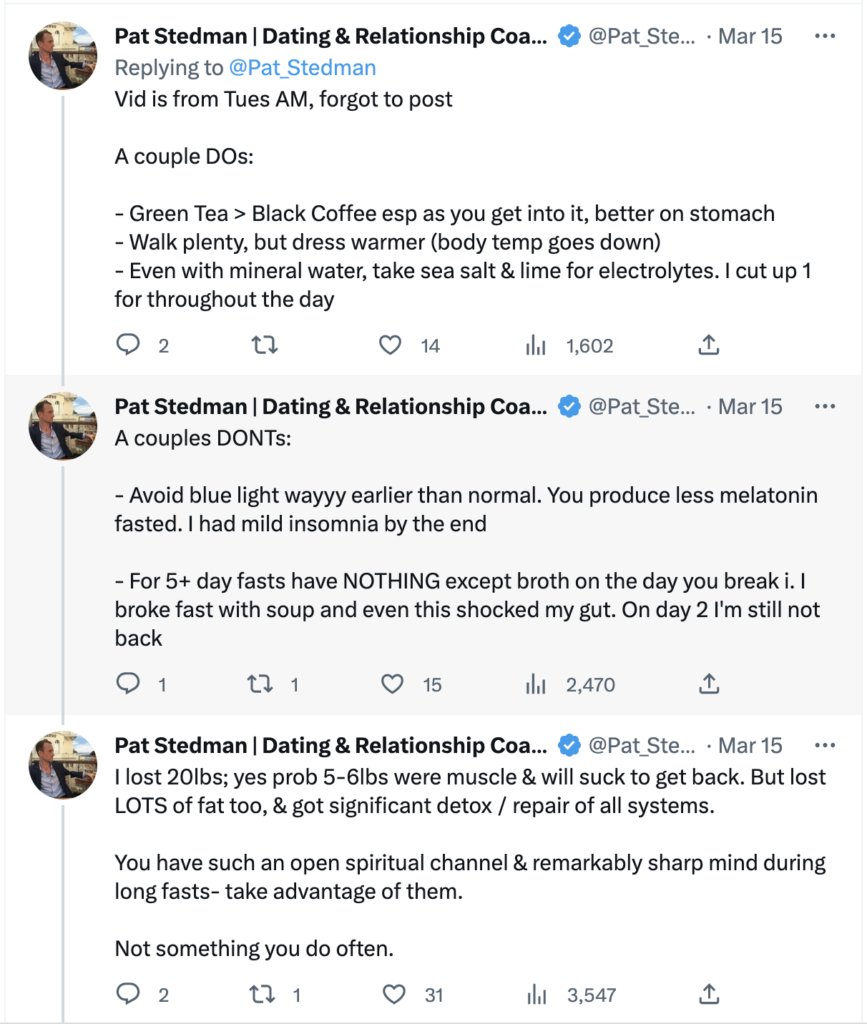
Which brings us to the million dollar question:
So should you do an extended fast?
I think everyone should do at least one full day of fasting at some point (aka nothing from waking to sleeping) for the mental stamina and to remind yourself that you don’t need food all the time. It’s a good perspective shift. And if you want to really challenge yourself, I think 3 days is perfectly respectable and should be in everybody’s capability. I view these kinds of fasts like being able to run 2 and 6 miles respectively; you don’t need to be an “athlete” for it.
Beyond this however, I don’t think you should feel compelled unless you are genuinely called to it.
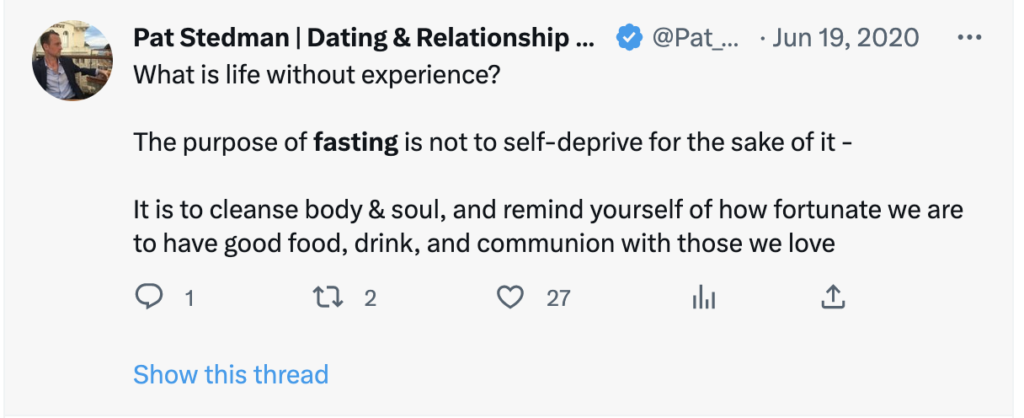
Extended fasting only has 2 valid purposes beyond personal challenge: extreme detox (beneficial in the case of illness / dysfunction) and connection with the divine.
The latter is especially important to me, not just due to personal inclination or my need for higher guidance at the moment, but because of the nature of my professional work.
Which might surprise you. But it shouldn’t.
I don’t simply teach guys the mechanics and psychology of successful dating and relationships.
I help them to evolve spiritually. Because that is truly the only way for most guys to get the kind of relationship they want.
They are stuck too low in consciousness. In fear, in weight.
I have to pull them out. I have to offer them the option of living life lighter.
So if you are looking not simply for expert advice, but profound guidance on your trajectory as a man.
I recommend you apply to work with me here: www.patstedman.com/application
– Pat
PS I am not a doctor. Do not construe any of the opinion and shared experience in this article as medical advice. Extended fasting can be dangerous; do your own research and make your own risk assessment. You are an adult – act like it.

